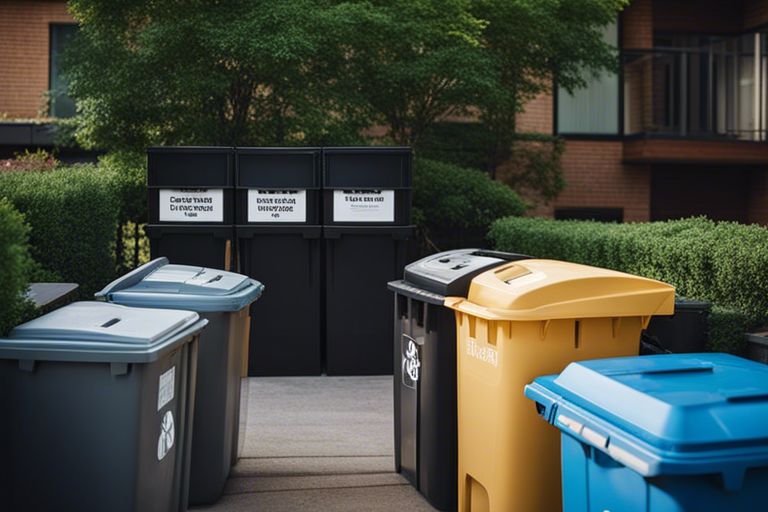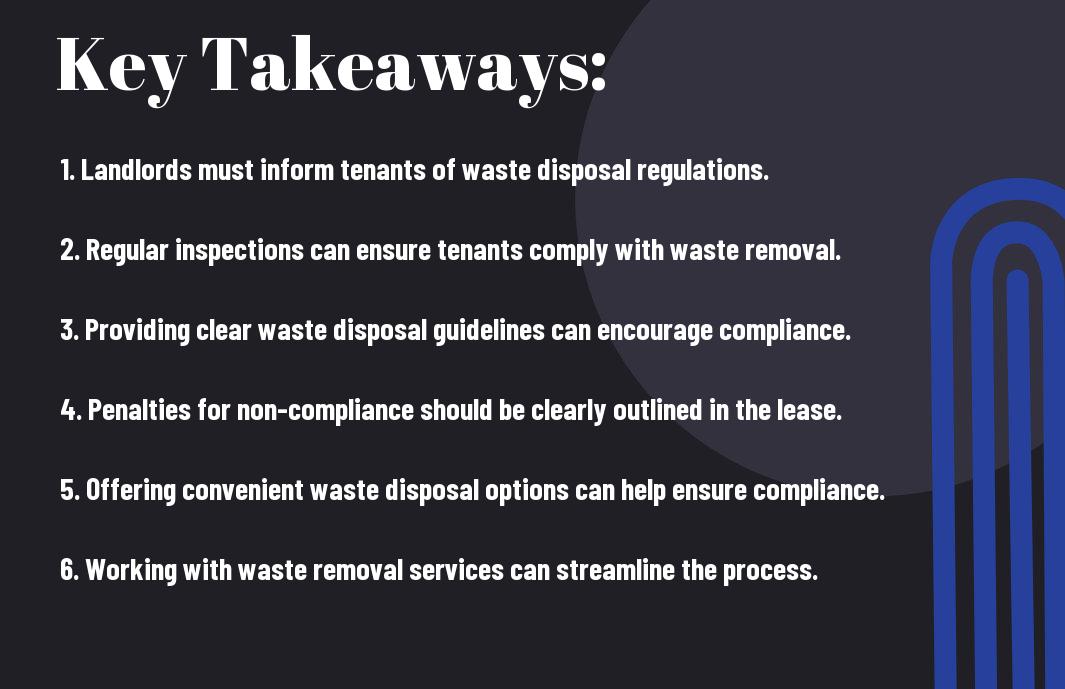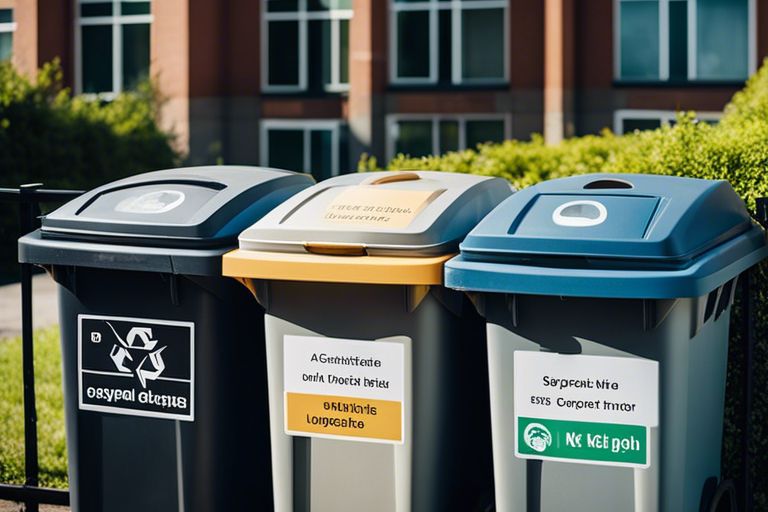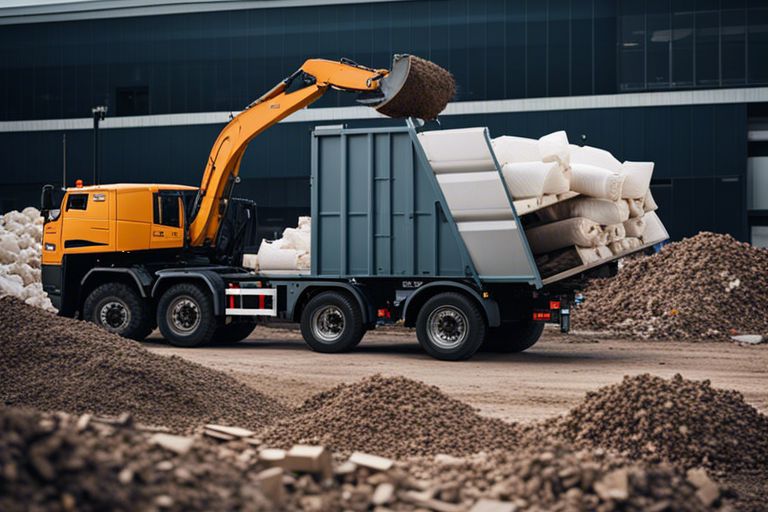Apartment turnover can be a daunting task for landlords, especially when it comes to waste removal. As a landlord, it is crucial to ensure that your tenants comply with waste removal regulations to maintain a safe and clean living environment. In this blog post, we will discuss the key responsibilities of landlords in managing waste removal and ensuring tenant compliance with regulations. It is important to be aware of the potential hazards associated with improper waste disposal, as well as the legal obligations that landlords must uphold. For more information on landlord responsibilities, you can also refer to this helpful article on 6 Landlord Responsibilities for Maintaining Rental Property.
Key Takeaways:
- Legal obligations: Landlords are legally responsible for ensuring waste removal and disposal complies with regulations, and failure to do so can result in penalties.
- Communication with tenants: It is important for landlords to communicate waste disposal expectations and provide clear guidelines to tenants to ensure compliance with regulations.
- Regular monitoring: Landlords should regularly monitor the property to ensure proper waste removal and disposal practices are being followed by tenants.


Understanding Waste Removal Laws
As a landlord, it is crucial to understand the waste removal laws that apply to your rental properties. Ignorance of these laws can lead to costly fines and legal troubles. By familiarising yourself with the regulations, you can ensure that your tenants comply with the law and maintain a clean and safe rental environment.
Federal and State Regulations
Landlords must be aware of both federal and state waste removal regulations. The Environmental Protection Agency (EPA) sets federal guidelines for waste disposal, while individual states may have additional rules and policies. It is important to stay updated on any changes to these regulations, as failure to comply can result in significant penalties and harm to the environment. Therefore, it is essential to work closely with your tenants to ensure that all waste is disposed of in accordance with these regulations.
Local Ordinances and Guidelines
In addition to federal and state regulations, landlords must also be knowledgeable about local waste removal ordinances and guidelines. Local councils and municipalities often have specific rules governing waste disposal and recycling. These can include guidelines for proper bin placement, collection schedules, and acceptable waste materials. Failure to adhere to these local regulations can result in fines and potential damage to the rental property’s reputation in the community.
Landlords should regularly communicate and educate their tenants about these local ordinances and guidelines to ensure compliance and prevent any issues. Providing clear information and resources can help tenants understand the importance of proper waste removal and maintain a positive relationship with the local community.
Strategies for Landlords
As a landlord, it is crucial to have effective waste removal strategies in place to ensure that your property complies with regulations and maintains a clean and safe environment for your tenants. By implementing the right waste management systems and educating your tenants about responsible waste disposal, you can avoid potential issues and create a positive living environment for everyone.
Educating Tenants about Waste Disposal
It is important to educate your tenants about the proper ways to dispose of waste, including recycling and separating different types of waste. Provide clear instructions on how to use bins and recycling facilities, and highlight the importance of following waste disposal regulations. Encourage open communication and address any concerns or questions your tenants may have about waste disposal to ensure that everyone is on the same page.
Implementing Effective Waste Management Systems
Implementing effective waste management systems, such as providing separate bins for different types of waste and arranging regular waste collection services, is essential for maintaining a clean and hygienic property. Consider installing secure and accessible waste storage areas and provide clear signage to guide tenants on proper waste disposal. Regularly monitor the waste management systems to ensure they are working effectively and address any issues promptly to avoid potential health and safety hazards.
By implementing proper waste management systems, landlords can create a clean and safe environment for their tenants while also complying with waste disposal regulations. This will positively impact the property’s overall hygiene and health and safety standards.
Managing Non-Compliance
As a landlord, it is essential to ensure that your tenants comply with waste removal regulations. Non-compliance can lead to serious consequences, including legal action and penalties. Therefore, it is crucial to have a system in place for managing non-compliance effectively.
To help landlords with this, the Recycling requirements for rental houses must be clearly communicated to tenants. Regular inspections and reminders can help identify any violations and address them promptly. Additionally, providing educational materials to tenants about the proper disposal of waste and recyclables can help prevent non-compliance.
Identifying and Addressing Violations
Regular inspections of the rental property can help identify any violations of waste removal regulations. If any violations are found, landlords should communicate with the tenants immediately to address the issue. Providing clear guidelines and education about waste management can help prevent future violations.
Legal Actions and Penalties for Non-compliance
If non-compliance persists despite efforts to address the issue, landlords may need to take legal action. This could include issuing formal warnings, fines, or even eviction in extreme cases. It is important to be aware of the legal options available and to take appropriate action when necessary.
It is crucial for landlords to understand the legal actions and penalties that can be taken against non-compliant tenants. Ignoring non-compliance can lead to further difficulties and potential risks to the property and the community. Therefore, it is important to address non-compliance promptly and assertively.

Innovations in Waste Removal
Eco-Friendly Practices and Recycling Programs
In recent years, there has been a significant shift towards promoting eco-friendly practices and implementing recycling programs in waste removal. Landlords can play a vital role in ensuring that their tenants are following the necessary guidelines and regulations for waste disposal. By promoting the importance of recycling and providing adequate facilities for separate waste collection, landlords can contribute to a more sustainable and environmentally friendly approach to waste removal.
Furthermore, the introduction of recycling incentive schemes and educational programmes can encourage tenants to actively participate in recycling efforts. With the help of local authorities and waste management companies, landlords can establish efficient recycling programs that not only benefit the environment but also comply with waste disposal regulations.
Technological Advances in Waste Management
With technological advances in waste management, landlords now have access to innovative solutions that can streamline waste removal processes and ensure compliance with regulations. Advanced waste monitoring systems and smart bins equipped with sensors allow for real-time tracking of waste levels and efficient collection schedules. This not only reduces the risk of overflowing bins but also minimises the environmental impact of improper waste disposal.
Additionally, the integration of waste management software and digital platforms enables landlords to monitor and manage waste removal activities more effectively. This includes tracking waste disposal records, scheduling collection services, and accessing valuable data for optimising waste management strategies.
The use of *smart bins* and *waste monitoring systems* has revolutionised the waste removal process, providing landlords with accurate data to improve efficiency and compliance. These technological advancements offer a proactive approach to waste management, ensuring that landlords are equipped with the necessary tools to uphold waste removal regulations and promote sustainable practices.
Waste Removal for Landlords – Ensuring Tenants Comply with Regulations
It is essential for landlords to ensure that their tenants comply with waste removal regulations to maintain a clean and safe living environment. By implementing and enforcing clear house rules related to waste disposal, landlords can effectively communicate the expectations to their tenants. Additionally, regularly inspecting the property and providing proper waste disposal facilities can help to uphold these regulations. To create a comprehensive set of house rules, landlords can refer to the top 10 essential rules outlined at House Rules For Renters The Top 10 Essential Rules. By taking these proactive steps, landlords can ensure that waste removal is properly managed and maintained, benefitting both the landlord and the tenant.
FAQ
Q: What are the regulations regarding waste removal for landlords?
A: Landlords are responsible for ensuring that their tenants comply with waste removal regulations as outlined by local councils and authorities.
Q: How can landlords ensure that tenants comply with waste removal regulations?
A: Landlords can include waste removal guidelines in the tenancy agreement, conduct regular inspections, and provide clear instructions for waste disposal.
Q: What are the consequences for landlords if tenants fail to comply with waste removal regulations?
A: Landlords can face fines or legal action if their tenants do not comply with waste removal regulations. It is the landlord’s responsibility to enforce these regulations.
Q: What should landlords do if they discover that their tenants are not complying with waste removal regulations?
A: Landlords should communicate with the tenants to address the issue and provide them with clear instructions on how to comply with waste removal regulations. If necessary, landlords can take legal action to ensure compliance.
Q: Are there any resources available to help landlords and tenants understand waste removal regulations?
A: Local councils and authorities often provide resources and information on waste removal regulations. Landlords and tenants can also seek advice from waste management companies or legal professionals if they have any questions or concerns.







